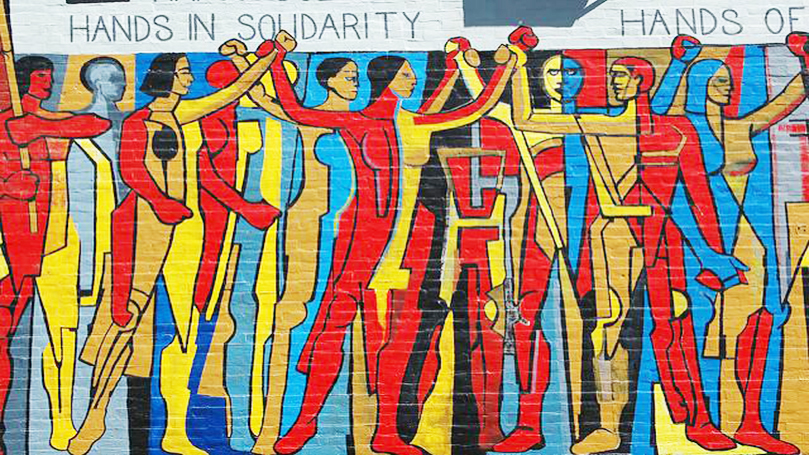
COVID-19 has exposed capitalism’s failure. Receiving top-secret intelligence about the pandemic, at least two U.S. Senators, Republicans Richard Burr and Kelly Loeffler, were caught selling tens of millions in their own stock portfolios and warning their rich donor friends just prior to the onset of the crisis that saw Wall Street markets tank.
It is certain that the secret information Burr and Loeffler used to protect their wealth spread quickly through much of the ranks of the capitalist elite. So far no one has been punished.
After the economic crash, Senate Republicans instinctively tried to provide a massive, free bailout for Wall Street first. During the crafting of that first bill, not a single Republican wondered where the money would come from to pay for it, as is their habit when we talk about Medicare for All or forgiving student loan debt. Later, as more congressional Democrats included more progressive provisions in their own bill, some Republicans tried to block it because, as they put it, it gave too much to workers (literally mere hundreds of dollars).
In his persistent fight to focus all attention on himself, Donald Trump deployed cynical and racist rhetoric to distract his base from the dangers his inaction posed to their lives. He promoted a useless drug to benefit wealthy investors in his campaign who own the drug patent. He attacked the media when they sought clear leadership from the White House based on sound scientific information. Trump frequently downplayed the danger of the virus, characterizing it as a “hoax,” to promote a return to “business-as-usual” to fuel Wall Street stock prices, risking the lives of hundreds of thousands of workers.
In the Wisconsin primary in early April, the Republican establishment forced voters to go to the polls despite the threat of infection. Instead of allowing an extended period for voting by mail to ensure that the people could practice their democratic rights safely, the Republicans demanded they vote in person, knowing that the virus would work as a vote suppression tactic and increase the chances for their candidates to win.
Donald Trump echoed this vote-suppression strategy by announcing his opposition to vote-by-mail plans that would protect voters from infection. Like his Wisconsin allies, he regards the virus as a potential vote suppression tool, voicing his fear that if more people are allowed to vote “Republicans would lose.”
Corporate bad actors have flourished as well. Amazon boss Jeff Bezos promoted a charity that sought donations for the workers he laid off, and has fought a group of workers who walked off the job in protest of the unhealthy conditions in his warehouses. Privatized water utilities owned by corporations like KKR and Suez have shut off water to local residents unable to pay bills amounting to hundreds of dollars.
Rich companies turn to socialized solutions while privatizing their profits and wealth.
The infamous retailer Hobby Lobby, owned by the right-wing evangelical Republican Party donor David Green, initially resisted closing its stores with the onset of the pandemic, noting “We serve a God who will guide us through this storm.” God must have changed his mind, because the stores closed just a couple of days later under pressure from its own workers who feared exposure to infection. Instead of providing promised paid leave, however, the company urged its laid-off workforce to apply for public assistance and charity.
Just a couple of examples of how rich companies will turn to socialized solutions that make the people pay for crisis, while they privatize their profits and wealth.
To be sure, the looming recession will promote more capitalist concentration as speculators buy up struggling companies in a bid to profit from the crisis. Others have deployed a concept called “risk mitigation,” which uses shady market bets to boost profits while millions of working families suffer.
Meanwhile, approximately 16 million workers have filed for unemployment in the past two weeks, and some estimates put the total out of work at 10% of the entire workforce. There is no end in sight to this economic collapse.
Most will struggle with rent, house payments, utility bills, grocery purchases, and debts. Trump and his allies will say, that’s “the story of life,” as if he gets to define for us what builds character or as if such unfairness simply can’t be dealt with.
But this isn’t the story of any life; it is the story of life under capitalism.
Social distance and capitalist ideology
In the lockdown of the new normal that is the medically necessary “stay at home” regime, like many people, I have been reading more. This week I picked up Lenin’s The Development of Capitalism in Russia. At just a little over 600 pages (in the Progress Publisher edition of Volume 3 of Lenin’s Collected Works) that include dozens of tables, fold-out charts, and figures, Lenin’s economic analysis of post-reform Russia is a page-turner.
Nestled in his ranging discussions of sugar-beet production, statistics on draught animals, techniques of rope manufacture, the dissolution of the Russian feudal peasantry, and the emergence of small industrial capitalist establishments, lies a familiar argument.
As entrepreneurs shift to commodity production for the sake of local, national, and global markets, a new phenomenon, which had not existed in feudalist conditions, comes into being: social cooperation in the labor process.
By organizing the production process in a single place with a large number of workers at the same time, capitalist industry, Lenin argued, citing both his own data and Marx’s Capital, enhances labor productivity by turning the labor process into a social process based in cooperation.
Under feudalism, people had labored in isolated and scattered conditions based on religiously ordained, personal deference and bondage to a landlord.
Lenin regarded capitalism’s introduction of social cooperation in the labor process as the source of capitalism’s improvement over feudalism. Social cooperation enhanced labor productivity and served as a basis for the new dynamism of the capitalist system relative to its predecessor (358–59).
Lenin adopted Marx’s views here, but he also foregrounded Marx’s caveat that this advance in social cooperation allows capitalist to more profitably and efficiently exploit workers. “Here,” Lenin argues, “stand out in full relief the dialectics of commodity production, which transforms ‘working with our own hands’ into working with others’ hands, into exploitation” (p. 351). Likewise, commodity production deformed workers’ bodies and relegated those who would not be successful in the new system to “utter pauperization.” It forced the poor into choices of labor for someone else’s profit or death that dehumanized them.
While it represents human progress out of feudalism, we should “not in the least forget either the historically transient character of this economic regime or the profound social contradictions inherent in it,” Lenin wrote (317–18).
Additionally, the social cooperation introduced to the labor process, by developing the productive forces serves as a basis for diversity of production, technological development, potentially improved standards of living, greater social connection across geographies, deeper involvement in civil society for workers, and broader ties to more distant peoples and lands.
But this social progress, Lenin argues, sees new technology and productivity as increasingly rooted in exploitation, because private-property law allows capitalists to keep profits and to own new implements, processes, and ideas created and used in the otherwise social labor process. So, for example, Jeff Bezos buys a $175 million mansion with profits he appropriates through ownership of technology that exploits private information and devastates small businesses, and then weeks later fires a worker who leads a protest against the risk of COVID-19 infections in his warehouses.
The realignment of feudalism into capitalist social relations and class processes enhances the human ability to make the things we need and want, to improve the quality of life in substantial ways. But the exploitation, brutality, and corruption inherent in capitalism, its contradictions, also emerge as the dominant form of our experience of it.
Social cooperation born with capitalist production linked workers in new ways through their work and their class interests.
Lenin regards the social cooperation born with capitalist production as a seed from which working-class organization can deal with the contradictions posed by capitalist relations, through collective forms of resistance that originate in that social cooperation. It linked workers and other potentially revolutionary classes together in new ways through their work and their class interests.
But, even as capitalism forged this new social cooperation, its ideological apparatuses taught workers to believe in their inescapable isolation. It insisted that we are individuals, that the fullest expression of our humanity lies in our distinct difference from one another. As the communist philosopher Jodi Dean argues in her book Crowds and Party, capitalist ideology works relentlessly and obsessively to peel workers apart from one another, to disdain collective cooperation outside the production process, to despise any sense of community.
In this way, capitalist ideology and capitalist social institutions habitually insist on “social distancing” for workers, even as capitalists and rich politicians take care of one another’s needs behind closed doors.
Capitalists fear us as a majority of the mass of humanity; they always have. They fear our power. They manufacture drugs to fog our minds, religious extremisms to distort our loyalties, poor education to stifle our creativity and criticisms, debilitating work to deform our bodies, war to inspire our hatreds and deflect our violence. Capitalism cultivates racisms, xenophobia, misogyny, homophobia, and religious hatreds to make us fear one another rather than hate it.
During this pandemic, the threat of infection requires us to maintain physical distance from one another to prevent its spread. But this doesn’t mean we have to accept the capitalist ideology of social distance. We have the technology to maintain social connection, or to be “physically distant but socially close,” as Joe Sims, co-chair of the CPUSA, argued in his opening to the Communist Party’s virtual town hall on April 5, 2020.
Image: Artist, Dan Manrique Arias; Photo, Terence Faircloth; Creative Commons (BY-SA 4.0).


 Join Now
Join Now